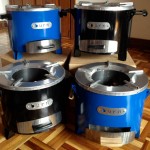JikOkoa
JikOkoa is the world’s most efficient charcoal stove. It reduces charcoal consumption by 50% while increasing cooking speed. The stove has been designed in the USA by Burn Manufacturing.
Protos Plant Oil Cooker
The Protos plant oil cooker is not only a solution for the basic human need of food preparation. With the initial research and development taking at the German University of Hohenheim, the basic fundamentals of the process of using plant oil as a cooking fuel were established. The further development into a market-ready product took place in the BSH production facility. Protos is a high-quality, highly durable, advanced technology cooking solution made with the customer in mind. It is an innovative contribution to sustainable development in developing countries and emerging economies that attempts to harmonize social, economic, and ecological priorities of the earth’s poorest regions in a very unique way.
Protos was intentionally designed to function similarly to a pressurized kerosene stove – which is widely available in the key target markets in Southeast Asia, Africa and Latin America in order to make it user friendly and easy to operate. The tank containing plant oil is pressurized to 1 bar. The burner is then pre-heated using alcohol spirit for approximately 4 minutes so that the plant oil is vaporized. The stove is then switched on and with a full 2-liter tank it can run 10 to 14 hours of cooking before requiring a refill. With Increased cooking speed, it takes less time to prepare meals, and cooking for a full hour a day, 2 liters can take a family for 2 weeks.

Ethanol Cookstoves
Alcohol cookstoves are pressurized or non-pressurized and can burn ethanol in liquid or in gelled or waxy forms. Most alcohol stoves can successfully combust ethanol in a fuel-water ratio of 80% and above, but some stoves endeavor to burn ethanol with higher water levels. Alcohol stoves do not require anhydrous ethanol (with the water removed), which is typically what is required for gasoline blending.
Fuel Type: Ethanol or methanol
Health Impacts: Ethanol and methanol burn very cleanly. Studies conducted in a number of countries, both in the laboratory and in household field tests, have shown the benefit of alcohol stoves in dramatically reducing indoor air pollution as compared to wood, charcoal and kerosene stoves. Alcohol stoves tend to produce significantly less CO (carbon monoxide) than stoves using kerosene or solid fuels and alcohol stoves that incorporate adequate oxygen in the combustion process achieve extremely low levels of CO.
Climate Impacts: Greenhouse gases released in the production and consumption of ethanol fuel are reabsorbed during the growth cycle of the plant material used to make the fuel. Especially damaging greenhouse gases like carbon monoxide and VOCs (volatile organic compounds) are not produced or produced only at extremely low levels. Black carbon aerosols, a potentially potent climate forcer, are essentially not produced by the combustion of ethanol and methanol.
Efficiency: Alcohol stoves function in a range of efficiencies with gelfuel stoves generally less efficient than liquid fuel stoves. The most efficient ethanol stoves are more efficient than solid fuel stoves and kerosene wick stoves and generally comparable to LPG and pressurized kerosene stoves.


